Love, Loss & Grief

Don’t get reeled in by scammers
Please think before you click: Scammers are targeting grieving family and friends by pretending online to be genuine businesses to access your money or other sensitive information. Please be aware that Burstows will NEVER charge you to view the livestream of a funeral or tribute.
Nor will we make social media profiles for funerals. We suggest families and friends refrain from creating such posts as well, as these can be trolled and fraudulently copied. (Please note that our Warwick branch does post funeral notices by request as per newspaper classifieds but there are no associated links.)
Scammers are many things but they are not stupid, and they are increasingly able to make what appear to be legitimate links, even copying business logos and style.
They may create social media profiles using the deceased’s name and photos to make them look real, sometimes posing as family or friends. They may create a URL that looks very similar to the real webcast link, except for a slight change in spelling, added letters or other characters, or a different domain.
Simply clicking on the link could be enough to give scammers access to your online details, or they may ask for a small fee or other personal details before you can “view the service” – which of course you will never see. They may even suggest donating to a “gofundme” to help pay for the funeral.
For your safety you will find access to any funeral livestreams directly through our website Tribute Centre https://www.burstows.com.au/tribute-centre. Here you will find service details for each person in our care or who we have cared for, a livestream link where available, and a window to add your condolences. If you have any questions, please call us on (07) 4636 9600.
Last edition, I illustrated how the meaningful funeral ceremony is like a tapestry. Made up of a number of elements, it creates a transformative experience that is much greater than the sum of its individual parts. While each family's ceremony will and should be a unique tapestry, it can only be a tapestry if it draws on a full repertoire of possible elements.
The rest of this series will explore, in turn, common funeral elements - taking you from the viewing/vigil through to the gathering for refreshments afterwards.
The first funeral element is that of the viewing. In some countries, this is historically called a "wake." The term "wake" comes from the Middle English "waken," meaning "to be awake, to keep watch." In days gone by, it was customary for the family and primary mourners to keep around-the-clock vigil over the dead body of their loved one. The body was kept in the home, often on display in an open coffin in the parlour. Twenty-four hours a day, mourners took turns sitting at the loved one's side to safeguard the body, offer prayers, pay their respects, receive friends and comfort one another.
Today, of course, the body is almost always safeguarded in the locked funeral home from the time of the transfer of the body from its place of death until the time of the funeral. No longer does the family stay present with the body during this time prior to the funeral. Yet the viewing remains a common element, one I believe continues to be essential regardless of the plans for ceremony and disposition.
In my next article, I will talk more about the role of the dead body itself in the creation of the tapestry that is the meaningful funeral ceremony. While I do believe that bodiless funerals are not as transformative as those that incorporate and honour the body throughout the process, I also want to emphasise that the viewing is an essential funeral element even when the family chooses to immediately cremate, or not have the body present during the ceremony.
The viewing can be a time of greeting and reception that takes place prior to the service. And even though many bereaved families choose this to be a private time, it is helpful for the families to consider the best ways to activate their support networks, and that is what making the viewing time less private can accomplish.
When families open the viewing to others, they are essentially inviting their friends and family members to come support them. The family is opening the door, quite literally, to a time of informal social greeting and empathy. They are creating an entryway for support. When they opt not to give opportunities for friends to gather with them, it's very common for those same friends to end up not supporting them.
In fact, after the death of a loved one, people often come up to me and say, "I was taken aback that quite a few of my friends never acknowledged the death. They have not called, they didn't even send a sympathy card. And when I saw my friend in the grocery store the other day, she didn't even say anything about the death. Why could this be?" The first thing I ask them is, "Did you invite friends to gather with you?" Almost always in these cases, the answer is no. The viewing and ceremony were private. Perhaps there was no ceremony at all. What these families didn't realise is that by choosing privacy, they were choosing not to open the door to support. Consciously or unconsciously, their friends took this to mean that they want their grief to be private rather than a community affair.
We continue to see a trend toward more efficiency, more privacy, less ceremony, and in its extreme immediate unattended cremation. Yet the full benefit of the viewing and ceremony can be made possible by allowing more people to attend. Sometimes holding the viewing a day or two before the ceremony, in the evening allows more friends to attend. This sets the community support in motion right away and gives people a chance to share news of the death with other friends and neighbours. But viewing opportunities right before the formal ceremony are also helpful and much preferred to no viewing at all.
In addition to inviting and accepting support from others, the viewing also helps the mourners acknowledge the reality of the death, encourages the sharing of memories (recall), gives them an opportunity for the expression of their inner thoughts and feelings, helps them begin to consider the meaning of their loved one's life and death and sets them on a course for integration through grief.
We know from experience that one of the first things many families do after the funeral is review the remembrance/memorial book to see who attended. This simple, common behaviour speaks volumes about the importance of gathering.
I encourage families to use this time to display memorabilia, solicit stories and memories from guests (you may like to place notepads, pens, instructions and a basket to collect the stories on a table) and play music in the background that is meaningful to the family.
Viewing is the funeral element that sets everything in motion. It opens the door to support and healing.
Did you know that the best way to move forward is sometimes to look backwards?
To “put the past in the past and move on”, as we are often encouraged to do, to rush through the process of farewelling a loved one, do nothing to mark their passing or to just hold a party and not allow ourselves time to face our loss, or embrace and deal with our raw feelings, potentially leaves us carrying emotional scars and baggage for years to come. Time alone will not heal grief.
“In my experience, remembering the past is the very thing that eventually makes hoping for the future possible,” says world-renowned grief counsellor and author Dr. Alan Wolfelt. “… Those who fail to go backward before marching forward after a loss, often find themselves stuck in the morass of carried grief.”
That’s why Burstows Funerals co-director Don Burstow says, whatever form you wish it to take, a funeral service should commemorate the life of your loved one and give comfort and a safe space for family and friends to express their personal loss.
“A funeral service is about the deceased and honouring their life, but it is largely for the benefit of survivors, and because of this it is a very important aspect of the healing process,” Mr. Burstow said.
Funerals and Ritual
Each with more than 40 years of experience in working closely with grief, Dr Wolfelt and Mr Burstow agree that funerals and ritual play a vital part in survivors’ healing journey, lessening feelings of isolation and validating shared emotions.
“Throughout history, when the import of an event or transition in our lives is more profound than everyday words and actions can capture, we’ve had the wisdom to turn to ritual … to our ancestors, our holy or touchstone texts, our traditions – before we celebrated what would come next,” Dr. Wolfelt wrote in The Paradoxes of Mourning.
Mr. Burstow says the primary role of the funeral service is “to encourage acceptance of the death, to allow expression of grief, to share that experience and find comfort.”
Giving Time to Memories
Memories provide an ongoing connection to the person who has died, as we deal with missing their physical presence. “…On the emotional and spiritual planes, (the mourners’) relationship with the person who died continues because they will always have a relationship of memory,” Dr. Wolfelt writes.
He states that funeral directors have a special role to play in helping families and friends “learn how to look backward through the lens of memory”. This includes allowing time to talk, laugh and cry about favourite, as well as potentially painful memories, during the funeral arrangement conference, and to help mourners incorporate photos, objects, music and memories into the funeral service.
Mr. Burstow says funeral directors know that a vital part of mourning is “telling the story” of who that person was, their relationship to family and friends and why their life was important in ways large and small.
“Because stories of love and loss take time, patience and unconditional acceptance, they serve as powerful antidotes to a modern society all too often preoccupied with getting mourners to hurry forward,” Dr. Wolfelt confirms.
Organisation and Aftercare
It is important that each funeral is individual and an appropriate tribute and farewell to your loved one. “Rushing through the planning process confuses efficiency with effectiveness,” Dr Wolfelt notes.
With Burstows Funerals, you enjoy the peace of mind of dealing directly with experts in the field and a family company with more than 120 years of service to the local community – people who have time for you, who truly care and who you can trust.
It is Burstows’ honour to guide those arranging a funeral through the legal, practical and emotional elements surrounding a death, to ensure you are fully and transparently informed, and that you receive counselling where desired as part of Burstows Funerals’ aftercare.
We remember always that funerals are important because life is important.
Faced with current Coronavirus pandemic concerns, in what is already a very difficult time, the team at Burstows are here to assist you every step of the way.
We welcome further easing of Covid-19 restrictions which will allow up to 200 people at funerals in Queensland.
The latest changes to government rules regarding gatherings in Queensland mean attendances of 200 people are possible at outside locations like a graveside or in a venue of 400m sq. or more. (Ratio applied to inside venues is 1 person per 2 m sq.)
- At Burstows Toowoomba, this means 100 people can gather in the TS Burstow Chapel, with an additional 50 people able to gather in the TS Burstow Pavilion alongside the Chapel to view the service on a large screen.
- The Pioneers Room, Burstows catering facility can now cater for 70 people and guests are no longer limited to an allocated seat, however buffet is still not allowed. Guests will be served individually by staff. We welcome this opportunity to provide you with a safe place to talk, share your sadness and help you celebrate the life of your loved one.
- We use cleaning and disinfecting protocols to clean our facilities after each service with particular attention paid to high touch items.
- We have increased the frequency of cleaning and disinfecting public areas every morning and evening.
- Proper and frequent hand washing is vital to help combat the spread of viruses. Our teams are reminded multiple times a day that cleanliness starts with this simple act.
- Additional hand sanitizer has been placed at entrances.
- Employees who exhibit cold or flu-like symptoms have been instructed to stay home from work.
- We request that guests who are experiencing any cold or flu-like symptoms including fever, cough and shortness of breath or who have been in contact with or have recently travelled to any affected areas refrain from visiting Burstows at this time.
For peace of mind, web streaming is available as an option for your consideration at Burstows
We appreciate that people want to be at the service in person but sometimes, no matter how hard you try, circumstances mean you just can't be there. In the present health environment, it is not worth risking your own health or those of others to do so.
Families and friends may wish to use our web streaming service, if a funeral is held within our TS Burstow Chapel. The service can be recorded and edited live by our audiovisual technician from within the Chapel. The video is then uploaded in real time so that anyone, anywhere in the world, who has been provided with a secure password and link is able to see and hear the service as it proceeds.
We highly recommend you rely on trusted and respected health services for information on the virus.
- WORLD HEALTH ORGANIZATION (WHO) – Coronavirus (COVID-19) Outbreak
- AUSTRALIAN GOVERNMENT DEPARTMENT OF HEALTH: https://www.health.gov.au/news/health-alerts/novel-coronavirus-2019-ncov-health-alert
If you have any questions, please feel free to contact our management team at 1800 803 196
You can choose an unattended cremation for yourself or a loved one and still deal with the local family business with a proven reputation for excellence, and people you trust.
At Burstows, our unattended cremation choice is just as important as any service we provide because our focus is your needs and wishes, and giving you the care and compassion to help you through your grieving journey.
From planning and organisation through to the final farewell, each person and each detail is important to us, however simple or complex your wishes may be.
Unlike new businesses without their own facilities, and offering only direct cremation, we are not driven by short-term sales, cheap products and gimmicks, or by the demands of shareholders to whom multinationals must answer.
We have a long-term commitment to doing the best for our community, and focus on positive outcomes for our clients above costs.
“The experience around saying goodbye to a loved one will impact you negatively or positively for the rest of your life. Therefore, who you choose to assist you in a time of grief is critically important. I respect every family’s right to choose, and sincerely offer my honest counsel gained through more than 40 years in funeral service,” co-director Don Burstow said.
At Burstows, we truly believe in the importance of a funeral ceremony to help acknowledge the death of someone we love, to provide a time and place to farewell them, remember them and share memories with others. The funeral offers physical and social support for everyone grieving the death and starts to provide a sense of healing and hope for the future.
However, an unattended cremation may be chosen for a number of personal or financial reasons. Our experience, together with the advice of the very best grief experts, has allowed us to put in place supports for those who do choose this option.
This includes transferring your loved one directly into our care at any hour of any day or night.
We provide personal guidance to ensure you understand your options, a no-obligation quote and, should we earn your trust, we arrange and plan the cremation, including preparation and lodging of all necessary documentation and applying for a certified copy of the death certificate.
We believe it is important for you to know how and where a loved one will be cared for prior to cremation, and we provide all necessary preparation, care and safekeeping of the deceased in our purpose-built Mortuary Care Centre. The cremation will also take place in the Burstows’ Cremation Facility, and the ashes kept safely for you to decide whether to scatter them, keep them in an urn or a memorial garden, for instance.
We provide a simple fully lined coffin (other options are available), and the opportunity for a private viewing at the funeral home. Should you wish, we will prepare a Photographic Tribute using 30-40 of your favourite photos set to music, which can be a beautiful centrepiece to any memorial gathering you may be planning. We can also prepare a Photographic Memorial Book as a beautiful keepsake that encourages reflection and remembering.
We also offer grief support from a team who keeps in touch with the family over the coming year as much or as little as required.
We know that spending money is never a measure of one’s love. We are committed to helping you find the choices that are right for you and your loved ones – choices that will embrace reality and remembrance, mourning, honouring and celebration.
To find out more about how we can help you, please contact us on (07) 4636 9600 or go to https://www.burstows.com.au/the-burstow-experience.
As Invocare, an international company listed on the Australian Stock Exchange, announces its recent purchase of Australian Heritage Funerals, Burstows Funerals continue to welcome and prepare the fifth generation of family members to serve the local community in this important personal work.
In 2020 Burstows celebrate 120 years of continuous family ownership with four members of the fifth generation of the family working well in various areas of the company.
“The trust this community has shown in our family for over 120 years is important and humbling to us,” says Don Burstow. Trevor & Don Burstow believe family ownership is the only way we can remain completely answerable to our community, and this partnership between our family company and our community is key to ensuring grieving families continue to receive the very best of care.
Absent & Delayed Grief
Not everyone cries. Not everyone feels their loss immediately or in the same way. But no one should be judged because “every grieving person looks different; there is no right or wrong way to grieve, and some will cope better”, according to Grief Centre general manager Katrina King.
Burstows Funerals has partnered with the Grief Centre to offer ongoing free support for up to a year to those who have lost a loved one.
Don’t make the mistake of thinking that just because people don’t show their grief outwardly they are not feeling it just as strongly, struggling internally, or perhaps feeling they have to be strong for others, Katrina cautions. Triggers such as an anniversary or other special occasions can often lead someone who had considered themself to be dealing well with loss, or “moving on with life” to “crash” and reach out for help.
“It’s a case of giving yourself to that moment and acknowledging that it’s okay to feel that way,” Katrina said.

“That person you love is no longer physically alive but you will carry them with you forever. You will always have that grief – it sounds harsh, but you don’t get over a deep loss – you will always hold onto that person in your heart and think about them. But I’m a big advocate of hope and belief and that there are also wonderful moments to come.”
Resilience
Katrina pointed to the experiences of Dr. Lucy Hone, a leader in resilience psychology who specialises in grief after the tragic death of her 12-year-old daughter in a car accident.
To foster resilience, Lucy realised she needed to become an “active participant” in her grief – to focus on what can be controlled, face all her emotions and adapt in what was such a potentially overwhelming situation.
The first step was cultivating hope. “That’s a really essential ingredient of resilience: the belief that you will get through this somehow,” Lucy said.
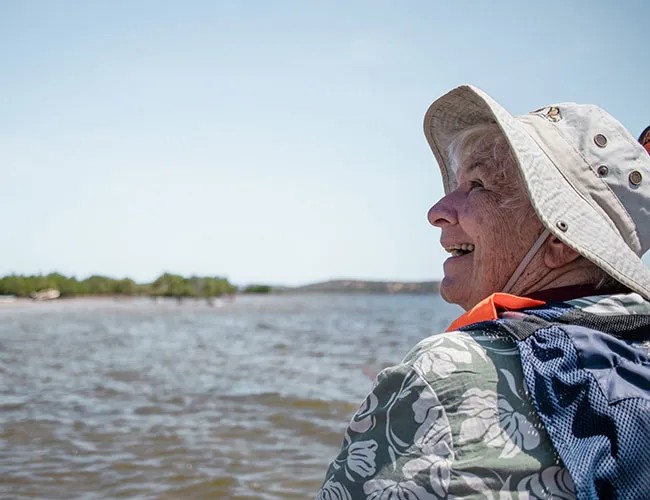
Another was identifying what helped her in her grief journey, such as photos, personal items and rituals, cooking a favourite meal or visiting a favourite place, and meeting with friends. Also, identifying what was negative, or harming her, such as poring over “what if” questions. “It puts us back in the driver’s seat, enabling us to detect thoughts or behaviours that only make us feel worse,” she said.
There is no need to remove those things that remind you of your loved one, rather the opposite is true, with contemporary bereavement research showing that it is healthier to nurture an ongoing connection even without your loved one’s physical presence.
What to Say When There’s Nothing to Say
Too often, people walk away from someone in grief because they are unsure of what to say, Katrina said, leading to yet another loss for the mourner, and potentially feelings of isolation.
“It’s important to be empathetic rather than sympathetic,” Katrina said. That means walking alongside the person experiencing grief, perhaps admitting “I don’t know what to say, but I’m here for you”, or “I hear you, would you like to tell me more?” This is quite different to saying “I’m sorry and either launching into your own experiences or trying to give false cheer, finding a silver lining by stating “at least …” or minimising the hurt by saying “time heals”.
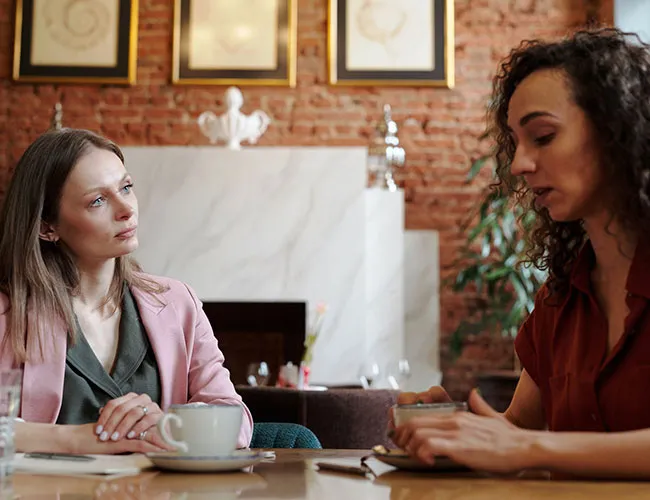
Give people the opening to talk about the person they have lost, to use their name, and let them continue to be part of that person’s life.
Please ask Burstows about the services available through the Grief Centre, or contact the centre directly at email aftercare@griefcentre.com.au, call 1300 270 479, or online at www.griefcentre.com.au.
The funeral is over, so what now?
A Year of Free Ongoing Grief Care
Experiencing the death of a loved one changes us and our world as we know it. So what happens once the funeral is over and that initial outpouring of support from family and friends begins to wane. "Life goes on", they say... but so does grief.
At Burstows, we know that healing from grief and loss is a journey, and that everyone needs support of different types and to different degrees along the way. That's why, as well as being there for you ourselves professionally, practically and emotionally in those first crucial days and weeks around the funeral, we partner with the Grief Centre to offer free ongoing grief care and counselling as needed for up to a year.
Grief Centre general manager Katrina King explained that the charitable trust has been working in New Zealand since 2009 and offering bereavement support in Australia since 2019. "Sometimes having someone outside your own circumstances can allow you to feel free to release your grief," she said.
Your Grief Companion
A Grief Companion from the Centre gives you a "wellbeing call" 6-8 weeks after the funeral, "providing a safe space to talk about your loss and how you are feeling", Katrina said.
"We know this is a good time to offer support because the formalities and practicalities of the funeral, paperwork and documents are over, and friends and family are beginning to move on, often leaving the grieving person without that immediate support they still need. By checking in during those early stages, we can help catch those who are not coping, or who know other family members who might need support." Grief Companions are highly qualified and compassionate and can offer unlimited phone support, but anyone needing additional professional help can be referred on to a Grief Counsellor.
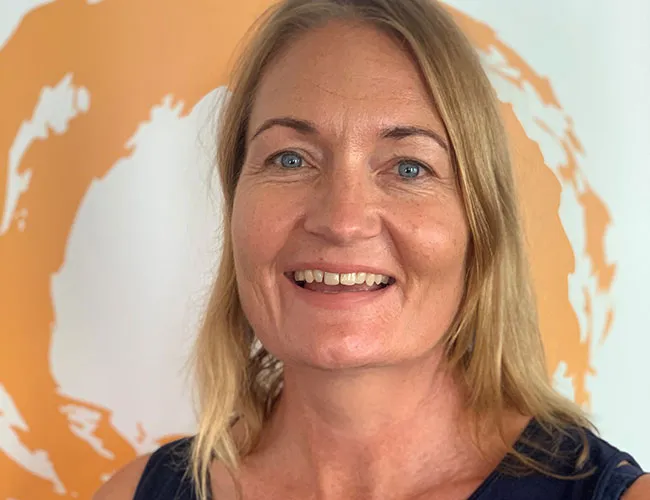
Katrina said people often think that those who have experienced unexpected and traumatic loss, or the loss of a young person, will have a more difficult grief journey. But grief has no hierarchy, and anyone can struggle.
Elderly people who have lost a lifetime partner, someone who has been the centre of their world for decades, can really be overwhelmed by their grief. "They often say when the Grief Companion calls that they are so glad to talk freely about their person, their life and their loss, to laugh and cry and have someone there to listen because they say they don't want to burden family and friends," she explained.
"There can also be multiple griefs. When someone dies, it can change our friend groups, how we live, we may have to move home, so it's about the bereavement itself but it can also be about transition grief, having to accept unexpected changes which you may not be comfortable with.
"Families can also be complicated, and there can be guilt about things said and not said, and complicated relationships that weren't repaired before the death, all of which can play a part in someone's journey."
Physical and Mental Symptoms
Grief is not just about feeling sad, it can be a "whole body experience," Katrina said, the extent of which often surprises people. "It can be overwhelming at first - you can feel sick, shake, not sleep or be constantly tired, your brain can seem like it's barely functioning... but it's all your brain's way of coping with something so difficult to take in."
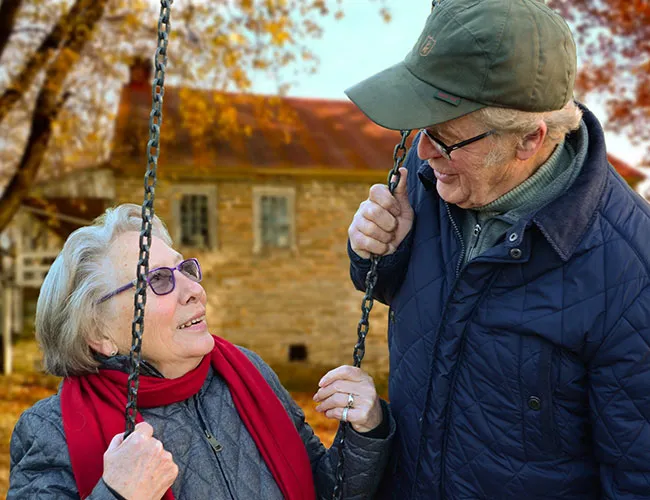
It's important, she says, to understand that this is all normal: you can and will get through it. Also important, is to understand that it's not as simple as "going through" the five stages of grief (anger, denial, bargaining, depression and acceptance) we have heard about - it's a continuum of emotions which can occur and reoccur in any order as you learn to move forward with your life and grief.
Tending to self-care - reading, talking, creating, exercising, listening to music, meditating, getting out into nature - finding the right supports and nurturing hope and belief, are all vital to moving through grief, she said. So too is accepting the bad days alongside the good.
"The sad fact is that loss is everywhere and it's something we all have to go through - we don't move on but we can definitely move forward."
Please ask Burstows about the services available through the Grief Centre on (07) 4636 9600, or contact the centre directly at aftercare@griefcentre.com.au, call 1300 270 479, or online at www.griefcentre.com.au.
When is the best time to discuss a funeral?
If you have the opportunity to talk about what you and your loved ones wish from a funeral before you are experiencing the pain and stress of grief and loss, it can make a real difference.
Pre-planned does not have to mean pre-paid. Just communicating with each other what you do and do not want and expect, sharing important aspects of your life and values, the people who mean most to you, can ease the way when the time comes.
We know these are not easy discussions. No one likes to think about death - no longer having that person's physical presence, their emotional support, feeling their hugs, hearing their laugh. But after a death, as well as the emotional and mental pressures to deal with, there is so much to be done - phone calls to be made, paperwork to be completed.
There is also a lot involved in planning a meaningful funeral that will be as unique as the person who has died and healing to mourners. And, as with most aspects of life, until you are faced with the experience, it is difficult to know where to start. Burstows, with a history of over 120 years behind us, are here to listen and guide you through the process, focusing on what is really important to you and your loved ones.
Our funeral directors are happy to organise no-obligation consultations on pre-planned or prepaid funerals. However, if your loss is unexpected, please be aware that a funeral service does not have to take place immediately after the death. Do not be rushed into decisions. This can be such an overwhelming period.
We encourage you to move at a pace you feel comfortable with - take the time to plan a service that will truly honour your loved one, express your grief, give you comfort and set you on the path to healing.
In deciding the day and time for the ceremony, allow yourself the space to make informed decisions and consider everything and everyone involved. This may include allowing travel time for mourners, or ensuring streaming services can be provided for those who cannot attend the service in person.
It is natural for people to want the pain of their loss to be over. However, grieving is a process. While it is a very important part of that journey, the funeral will not end the pain of your loss - it does not provide 'closure'. Understandably, losing someone you love is just not that easy.
In his book, Creating Meaningful Funeral Ceremonies, world-renowned grief expert Dr. Alan Wolfelt writes, "Grief is not a disease (from which you can be cured). Instead, it is the normal, healthy process of coping with the death of someone loved. And while no 'treatment' exists for what you are feeling, I promise you that if you can see yourself as an active participant in your healing, you will experience a renewed sense of meaning and purpose in your life".
Taking part in a fitting final farewell, being surrounded by all those who loved that person, remembering them, the important role they played in our lives, and providing each other comfort, will be the start of healing.
Dr. Wolfelt concludes by saying, "I truly believe that while a funeral cannot change what has happened - the death of someone precious to you - it can and will make a significant difference in how you channel your grief towards healing... When words are inadequate, the ritual of ceremony is both fitting and healing".
Please ask us about Burstows' special free memento book, Memories of a Lifetime ... In My Own Words, in which to record the reminiscences, dreams, advice, values, beliefs and life lessons closest to your heart as a treasured keepsake for your family, as well as your funeral wishes if you desire.
The smell, the presentation, the sharing of food and drink, bring us together, nourish our spirits, warm us from the inside, and help us to feel a little more whole.
After all the raw emotions of a funeral, gathering in a more relaxed atmosphere with others who have loved and lost that person has a uniting and healing effect that Sandy Lee has seen repeatedly over 25 years as catering manager at Burstows Funerals.
Grief expert Dr Alan Wolfelt describes the reception as "an informal time of release after the more formal elements of the funeral ceremony. The gathering is also a transition, a rite of passage back to living again. It demonstrates the continuity of life, even in the face of death".
For Sandy, the reception is a time of bonding; a place where memories come alive. It's a place to tell stories, talk about the deceased, their interests, their passions, perhaps their foibles, share your pain, to catch up with each other, and simply start to feel that life will go on.
It's a place for hugs, for laughter, for introductions and old friends.
"So often people today only really gather at weddings and funerals, so it is a special time for family, for classmates, old friends and neighbours to catch up," Sandy said.
"When families are going through so much, Burstows' Pioneers Room is a lovely, peaceful place. With the gardens outside, the Pavilion, and even the children's playground, it has a wonderful warmth and homeliness. There's the smell of coffee or tea, of freshly baked cakes and scones ... it's not exotic but it's food made with love and it's very comforting, I think."
When receptions couldn't be held during Covid, or gathering restrictions were in place, Sandy said "the hardest thing was no hugging or contact ... a lot of people just need that touch at a time when you have lost someone so dear to you".
Like the funeral, the reception is different for everyone, depending on the deceased's character and the circumstances. Perhaps the death could be foreseen due to age when, despite their sadness, people can rationalise that the deceased "had a good life" and "lived well", or it may be an unexpected tragedy. Regardless, those closest to the deceased need support - to know they are not alone.
In a campaign against loneliness, cooking guru Julie Goodwin said it perfectly, "Food connects us, it nourishes us, and the sharing experience creates wonderful memories and strong communities".
While there is often some tentativeness on first arrival at the reception, as people wonder what is expected, Sandy said the welcome they receive quickly puts them at ease, and the room is soon full of chatter.
Those organising funerals have told Sandy said that knowing the Pioneers room was there, rather than having to make more decisions when your mind has so many things to think about, eased their stress. And for those attending, it is a relief to just take those few steps from the Burstows Chapel to the reception... no need for farewells, nowhere else to drive, nothing to co-ordinate.
At times, families have special requests to include in the reception a favourite food, colour, hobby, sports theme or music of the deceased, and the Burstows team "do everything we can to help make that happen".
For herself, Sandy says being involved in what many would see as a difficult field, is very rewarding. "I can truly say that, although there have been challenges at times, I've really enjoyed my years here, the team I work with, and being able to help people through this process of grieving and put them on that road to healing ... it's very special."
For inquiries regarding the reception or any aspect of funeral planning, please contact Burstows Funerals on (07) 4636 9600.
Music plays such a soothing, healing, spiritual and energising role in our lives from our earliest days that it makes perfect sense it is also an essential part of our funerals. In her new autobiography, Time of My Life, music guru Myf Warhurst beautifully sums up why music is so important to us:
“It connects us, consoles us, lifts us up and helps us make sense or our place in the world”. She goes on to say that music “offers us mere mortals a way to access feelings and make sense of our thoughts, at times when we might not have the emotional or intellectual language to do so on our own”.
In the case of funerals, music sets the mood—sad, serious, uplifting, perhaps elements of all three. Where the funeral is to be held, and the personality of the deceased, will undoubtedly influence your choice of music. You may want songs that reflect different sentiments at various points in the service, possibly finishing with a song of hope.
Funeral venue, as well as personal preference and budget, will also play a part in deciding whether to opt for recorded or live music, including instrumentalists, soloists, choirs or groups. For friends or family with musical talent, performing during the funeral can be an incredibly touching, if difficult final gift to their loved one.
While hymns are no longer the only music considered “suitable” to funerals, many people still choose these due to the funeral venue, as a mark of their faith, a comforting tradition and/or a link with the hereafter and something greater than ourselves. This can be very significant for many as the death of a loved one makes us consider our own future, our own mortality and the meaning of life.
Amazing Grace, Abide with Me, How Great Thou Art, Be Thou My Vision, The Lord’s My Shepherd, The Old Rugged Cross and Lord of all Hopefulness are some of the perennial Christian hymn choices. It may surprise you to know that Ave Maria isn’t strictly a hymn, but it is certainly one of the beautiful, comforting and spiritually uplifting songs often played at funerals. Jeff Buckley’s Hallelujah also falls into this category.
This is by no means a definitive list, and your choices will be individual and personal to you and your loved one.
Choosing the right musical accompaniment to the photographic tribute or slideshow often shown as mourners enter and leave the funeral, during the service or at the reception afterwards, is not easy. This is such a bittersweet moment of connection and memories, and it is important that the music blends seamlessly with the photos, rather than jarring. The slideshow often brings gentle laughter as well as tears, reminding mourners of happy times for and with the deceased, allowing them to commemorate and celebrate the life of their loved one in a very human, rather than an abstract way.
Research into the use of music when facing death in hospices and palliative care has consistently found that patients, family, and staff all benefit from music, which helps decrease anxiety, agitation, and pain. Music’s healing properties undoubtedly continue at the funeral and beyond.
As with all aspects of a funeral, remember, there is no “right” way to say farewell to a loved one other than what is right for those closest to them. Our team at Burstows Funerals are always here to provide information and advice about how to create a meaningful and healing experience.
Please remember that funeral services in the TS Burstows Chapel can be livestreamed for those unable to be at the funeral in person, and service recordings are also available. (We can make these services available at other venues where possible, given prior notice.)
Without love there is no grief, but who wants to live without love?
When someone you love dies, you are never quite the same - you never "get over it", as such. You just learn slowly to go on without them physically in your life, "always keeping them tucked safely in your heart". As American author Mitch Albom (Tuesdays with Morrie) writes, "Death ends a life, not a relationship".
As you learn to live with your grief, and the pain starts to ease, it doesn't mean that you love that person any less. It is simply part of your journey towards healing and allowing you to go on with your life.
World-renowned grief counsellor Dr. Alan Wolfelt urges us not to fall into the trap of thinking that enjoying ourselves, laughing, being with others and having fun are somehow betrayals of the person who has died, or mean we didn't truly love them.
He says the idea of "moving on" from grief implies that mourners will somehow, at some point, just leave their loss behind. But that's not how it works. "How it works is we take our loss by the hand and learn to walk forward with it into our continuing lives."
"Sometimes it helps to think about what the person who died would want for you. Wouldn't she or he want you to laugh and continue to find joy in life, even in the midst of your sorrow?" he asks.
Think about the fun times you shared with that person, including their sense of humour, smile and the sound of their laughter. "Often, remembering the person who died and smiling and laughing is an honest reflection of aspects of what she or he brought to the dance of your life together," Dr. Wolfelt says. It can also make you feel better, with studies showing that smiling, laughing and feeling good enhance your immune system and make you healthier.
Dr. Wolfelt believes that truly accepting that someone you love has died is "a process, not an event", and "embracing this painful reality is not quick, easy, or efficient". He acknowledges that even after 16 years, he still has moments when he remembers he will never see his father again in this world, "and I gasp aloud at the hurt of the realisation".
Grieving is far from a straight line, he says. "You may move back and forth between protesting and encountering the reality of the death. You may discover yourself replaying events surrounding the death and confronting memories, both good and bad."
So, grieving helps us to heal and move towards a different future, but it also has another effect. Dr. Wolfelt writes: "Grief and loss teach you to cherish your relationships - to never take them for granted. Grief teaches us we need others and to keep reaching out, to not exclude ourselves from the wonders of love and companionship…..
"There is no experience in life that can match the joy of giving and receiving love."
*Gratefully acknowledging the work and words of Dr. Alan Wolfelt, in Eight Critical Questions for Mourners …. and the Answers that will Help You Heal.
A meaningful funeral experience is vital to the present and long-term mental and emotional health of those grieving. It helps us move from life before a death to life after a death.
At Burstows Funerals we believe that every funeral should be unique to the deceased and their family, that families should never feel pressured or rushed during the funeral process, but feel free to experience their natural grief and mourn openly whenever the need arises.
For those attempting to cope with the seemingly overwhelming loss of someone precious to them, direct cremation and cardboard casket operators offer a superficially “quick, cheap and easy option”. They appear to provide the chance to “get this over with” and appeal to the notion that the deceased wouldn’t want you to be sad.
“He who has no time to mourn, has no time to heal,” as English scholar John Donne said.
The Australian Psychological Society states, “Grief is the natural reaction to loss, and can influence the physical, emotional, cognitive, behavioural and spiritual aspects of our lives. For most people, the experience of grief will dominate their emotions, thoughts, and behaviours for a number of weeks or months”.
The way people cope and the intensity and duration of grieving will be different for everyone. It is no reflection on how much they care. In fact, rather than “getting over” our grief as such, it is something that gradually softens and we become reconciled to our loss and begin to find new meaning in life.
World renowned grief counsellor Dr Alan Wolfelt believes today’s culture “tries to be happy when we should be sad … The death of someone loved changes our lives forever. And the movement from the ‘before’ to the ‘after’ is almost always a long, painful journey”.
“You should not deny your need to mourn and to embrace painful feelings of grief …. When we deny, inhibit, defend against emotions, our pain lasts longer,” Dr Wolfelt said.
So, saving time and possibly money, avoiding ceremony and “fuss”, and skipping the undeniably sad process of planning a funeral, can in fact come at a huge mental and emotional cost.
Burstows Funerals co-director Don Burstow recalls mentor and friend Alan Anderson telling him as a young man that “the guidance and counsel received 48-72 hours after the death of a loved one will impact that family either negatively or positively for the rest of their lives”.
That puts a huge responsibility on the shoulders of funeral directors, and is something Burstows Funerals takes very seriously. It is our purpose and honour to guide you through this sad and stressful time and to provide a unique, individualised transformational service experience that celebrates the deceased’s life and helps families and friends start the journey of healing grief.
We know that for a funeral to be effective it must achieve key elements for those grieving:
- REALISE – Gently confront the reality that someone loved and cared for has gone.
- REMEMBER – Embrace and share precious memories because remembering the past makes hoping for the future possible.
- RECEIVE – Allow mourners to give and receive comfort and support from family, friends and professionals and know that they are not alone.
A funeral is not an ending, nor does it provide closure. It is about starting those who grieve on the journey to healing and moving towards a new future. Because of that, because life is so important, because grieving families need reliable, ongoing care that affirms their need to continue to mourn, it is not something to be rushed.
This may seem a strange question, but these days too often we are urged to simply dispose of the body of a loved one – ‘just cremate me’, ‘get over it’, ‘have a party’ and ‘move on’ – rather than dealing with the reality and pain of the loss we have experienced. Research has shown that how we say goodbye to a loved one, and the experience surrounding this, can impact us positively or negatively for the rest of our life.
The often rushed, so-called ‘new way to funeral’ does not meet the emotional needs of grief by taking mourners through the vital steps towards healing. Instead that loss is minimised, offered a ‘quick fix’, leaving the pain of sadness and separation unadressed.
At Burstows, we know that for a funeral to be effective it must meet four needs, which we call the 4 Rs: REALISE – REMEMBER – RECEIVE – RELEASE. Addressing these does not lead to closure, but does start the journey towards healing and taking the first steps towards a life without your loved one physically present.
Realise
Aspects of the funeral experience help mourners truly accept that the death is real. Planning the funeral, talking about the death itself, choosing the coffin, music, photos, spending time with the body, gathering with others, and the ceremony itself, all help us to acknowledge the reality of the death. Without this acknowledgement, it is impossible to truly move forward with your future life.
Remember
A helpful funeral experience will embrace many opportunities for those grieving to reflect and remember. As funeral directors, we find families often laugh as well as cry as they remember aspects of their loved one’s life. This occurs both during discussions arranging a funeral, as well as while sharing stories of that person, their life, and what made them special at the funeral itself.
Receive
The funeral is a special time and place to support one another in grief. That is why we say that while the funeral is about the deceased, it is for the living. While the form may differ, gathering together to honour the departed at the time of death, and share our grief has been an important part of societies worldwide throughout history.
Release
Finally, the funeral helps survivors to release or say goodbye to their loved one. It acknowledges that the relationship of physical presence has ended but does so in a supportive and loving environment. It helps us to embrace the love and qualities of that person which we can continue to carry with us.
The 5th R – Respect
At Burstows respect is a vital element of all our dealings with both your loved one and yourself. We do not outsource our services to third parties as online operators without any form of facility, mortuary, transfer vehicle or personal contact do.
We will transfer your loved one into our care at any hour of the day or night, and provide personal guidance to ensure you understand the options open to you. We can discuss funeral arrangements at your own home or at our premises, and help you through the necessary preparations, including all required documentation and applying for a certified copy of the death certificate.
We also respect that everyone’s grief is individual and offer a non-intrusive professional grief support service which will keep in touch over the coming year as much or as little as feels right for you. It’s all part of Burstows understanding that funerals are important because life is important.
If you have lost someone special, especially in the past year, you might be questioning where the joy is this Christmas season, or how you can possibly have a “Happy Birthday”. That missing piece in your heart and your life can seem even larger on any special occasion. So what do you do?
Well, like anything to do with grief, it is individual, and the best advice we at Burstows can give is “be gentle with yourself”. To those supporting someone in mourning, listen to that person’s needs and don’t try to “jolly” them out of what are very real and valid feelings.
Keeping the Memory Alive
We know how important it is to healing to keep the memory of the person who has died alive and acknowledge the special role they played in our lives, so don’t (with the very best of intentions) avoid speaking about that person for fear of upsetting or “opening old wounds”.
Renowned grief counsellor Dr. Alan Wolfelt recommends “a good way to embrace your grief on these days is to make a point of honouring the person who died”, to “actively remember … through shared activities and memory-swapping”.
Reaching out to let someone who is grieving know you are thinking of them, acknowledging their loss and asking how they feel can make all the difference at what can be a lonely time. It can be particularly hard for someone to share how low they are feeling when society expects us all to be “merry and bright”. But it is equally important if you are grieving to feel safe in leaning on others for support and understanding, knowing that family and friends want to be there for you.
It may help for you to consider ahead of time what challenges you may face this festive season, or on other special occasions – what may be expected of you, and your preferences for these times. Remember that grief consumes a lot of energy. Allow yourself to trim down your commitments, as well as leaving space for your needs to change, and updating others so they can accommodate these, or just letting them know on the spot that you are having a tough moment or a tough day.
Allow Yourself to Be Sad
Regardless of the time of year, sadness, Don Burstow says, is entirely appropriate after the loss of a loved one. We shouldn’t be afraid of tears or “ruining the occasion” by expressing our feelings.
“The only way beyond grief is through it,” he said, and that is likely to involve tears, reflection, laughter, even anger, as well as gratitude for that person’s life. “Through embracing sadness comes the healing we need,” Don said.
Some people will not feel like putting up a Christmas tree, marking a special event, or perhaps participating in what have been long-held celebration traditions … That’s okay – take the grieving person’s lead as to what they need – embrace them in plans and be there for them to talk to if and when they need. Others will want to join in festivities as much as possible, and should not feel guilty about happiness or moments of joy: they do not mean you care any less for the person who has died.
In his book, Eight Critical Questions for Mourners, Dr Wolfelt says, “Humour is one of the most healing gifts of humanity. Laughter restores hope and assists you in surviving the pain of grief … Often, remembering the person who died and smiling and laughing is an honest reflection of aspects of what she or he brought to the dance of your life together. And I ask you, what could be better than that?”
Some people will begin new traditions – lighting a candle for the deceased, displaying their photo or a keepsake of theirs at the Christmas or birthday table so they are with you in some physical sense, sharing anecdotes about them, saying a prayer, doing something that person particularly liked to do, or perhaps planting a bush or tree in their honour.
Grief is a Journey
Remember there is no “right” answer, no one-size-fits-all, quick-fix or guaranteed approach … your grief journey to healing is your own.
Dr. Wolfelt says “Whether the death was sudden or anticipated, acknowledging the full reality of the loss may occur over weeks or months”. Grief does not have a timeline and healing is an ongoing and at times painful process, so don’t fall into the trap of expecting yourself or someone else to “get over it” and move on after a given period. With time and acceptance, you will find a new future without that person physically in your life.
To those grieving, and their family and friends, ongoing compassion, support and love will be the best gifts of all.
Sometimes as carers, it’s difficult to acknowledge that we need to also care for ourselves.
Pushing your feelings aside, believing the old adage that “when the going gets tough, the tough get going” and that you need to just “carry on” regardless of the stresses you are under, ultimately puts both yourself and those you are trying to care for and protect at risk.
World renowned grief counsellor Dr Alan Wolfelt says, “whenever stress rises, self-care tends to fall”. This can lead to burnout and mental and physical health issues as your immune system becomes compromised.
Caring for yourself does not have to be complicated. What is sometimes hard is acknowledging that you need that time for yourself, and recognising that it is in everyone’s best interests.
Basic Self-care
What can you do? Firstly, rest whenever you get the chance. When stress rises, so does your body’s and mind’s need for restorative rest. Take moments to breathe and recentre yourself. If you are having difficulties sleeping, remember to exercise, consider meditation to rest your mind, or contact your GP.
Next, eat well and drink enough water to stay well hydrated. Not doing so can lead to fatigue and headaches, making it harder to deal with situations.
Connect with friends and loved ones. No matter how busy you are and what the needs of others, you need and deserve some quality time with those you love, Dr Wolfelt reminds us.
Share your thoughts and feelings rather than keeping everything inside. Remember, even while you are caring, there are others who care for you and will be there for you. “Open up regularly to the good listeners in your life”, Dr Wolfelt encourages.
Be Thankful
Being thankful may seem like a strange, contradictory, even an impossible ask at a time of grief and stress. However, on days when you’re feeling the most overwhelmed, it is important to remember there are still many things to be grateful for.
“Intentionally place your awareness on good people and happenings around you. Notice all the kindnesses and support. Have compassion for mistakes or failings,” Dr Wolfelt advises.
Find Pleasure
Finally, Dr Wolfelt encourages us as carers dealing with grief and stress to “make room in your daily schedule whenever possible for something that gives you pleasure. Give yourself permission to spend at least a few minutes on something that brings you enjoyment and helps you to decompress and relax”.
Those you are caring for need you, so for their sake as well as your own, take care of yourself.
Faced with current Coronavirus pandemic concerns, the free web streaming service available for all funerals held in the TS Burstow Chapel could relieve stress for many mourners.
Burstows Funerals co-director Don Burstow said web streaming is available for all services, but could be particularly helpful at present to those most at risk from Coronavirus – the elderly and people with pre-existing medical conditions.
All you require is a standard internet connection and a basic understanding of computers to be able to stream a live video of your friend or loved one’s service in your home.
“We appreciate that people want to be at the service in person but sometimes, no matter how hard you try, circumstances mean you just can't be there,” Mr Burstow said.
“In the present health environment, whether to attend a funeral can be a very difficult decision for many people to make, but it is not worth risking your own health or those of others to do so.”
Mr Burstow said while the current health crisis was the perfect example, web streaming was valuable at any time to those who may not be able to attend a service in person to say their farewells due to work or family commitments, illness, mobility problems, distance etc.
For families wishing to use the web streaming service, the funeral is recorded inside the TS Burstow Chapel and edited live within the chapel by our professional audiovisual technician.
The video is then uploaded in real time so that anyone, anywhere in the world, who has been provided with a secure password and link is able to see and hear that particular service as it proceeds.
“We understand the importance of the funeral and the part it plays in the mourner’s healing journey and this is a practical way to help everyone who wants to be a part of that special time to do so,” Mr Burstow said.
Funeral Directors are like any other professional or businessperson…those who charge the least intend to do the least, they cannot afford to do otherwise.
It is positive that we see more and more service providers being transparent with their pricing. Being transparent with pricing is of little value if the provider is not also transparent with their process or offering.
I generally do not provide my insights on other service providers, yet in the age of technology it is so easy to hide behind attractive prices and comforting words on a website or social media. The experience around saying goodbye to a loved one will impact you negatively or positively for the rest of your life. Therefore, who you choose to assist you in a time of grief is critically important. I respect every family’s right to choose and sincerely offer my honest counsel gained over 39 years in funeral service.
A national online cremation provider boasts about not having any form of facility, mortuary, transfer vehicle or personal contact. Every task associated with your loved one’s transfer and cremation is outsourced to third parties. I am therefore skeptical when such an offering speaks of the loved one being ’transferred into our care’ and ‘our highly experienced team carry out a simple cremation’. Such a provider is in no way invested in the process just invested in the online sale.
The Burstows offering to the family choosing unattended cremation
Our unattended cremation choice is as important as any offering we provide. We have put in place a sequence of services that our experience, and the very best grief experts believe are best practice in providing the necessary long-term benefits for those who grieve.
- We will provide personal guidance to ensure you understand your options, provide our offering proposal without obligation, and should we earn your trust, arrange, and plan the cremation including the preparation and lodging of all necessary documentation and applying for a certified copy of the death certificate.
- We will transfer your loved one into our care at any hour of any day. This is an important duty that we do not contract out unless significant distance would require that consideration, in which case you our client family would be consulted.
- We will assist with the wording and placing of death notices if required.
- We will provide a simple MDF board coffin, fully lined. Other coffin choices are available.
- We will provide the necessary preparation, care and safe keeping of the deceased for the requested duration, in our purpose-built Mortuary Care Centre. It is important to us that we know how and where a loved one will be cared for and kept prior to cremation. We hope this is important to you also.
- We will provide an opportunity for a private viewing at the funeral home. Initially you may not want this, but as time unfolds leading to the cremation, you or other family members may decide they need this. Our service understands the changing needs of those who grieve, and we will respond to those needs.
- We will attend to the cremation in Burstows Cremation Facility.
- We will prepare a Photographic Memorial Book. This is a very helpful resource that encourages ongoing reflection and remembering.
- We will prepare a Photographic Tribute. 30 of your favourite photos set to music. This is a beautiful centre piece to a memorial gathering you may be planning or a treasured keepsake. The combination of photos, music and motion powerfully moves us in remembering the past.
Leading therapist and author Dr. Alan Wolfelt says “remembering the past is the very thing that eventually makes hoping for the future possible. Mourners’ lives will open to renewed hope, love and joy only to the extent that they first embrace the past.”
- Grief Centre support. A non-intrusive professional support service that seeks to see how you are doing. The support team is available to keep in touch over the coming year as much or as little as feels right for you.
Spending money is never a measure of one’s love. We are committed to help people find the choices that are right for them be they beautifully simple and uncomplicated or an occasion that requires significant planning and direction. Choices that will embrace reality and remembrance, honouring and celebration. An experience that will help you begin a healthy journey of healing grief.
Sincerely,
Don Burstow
We all want to protect our kids from any form of hurt or sadness but, since we don’t live in a perfect world, the best we can do is give them the tools to deal with sadness and grief.
Whether it’s the death of a friend or relative, of a pet, a fight with a friend, a lost or broken toy, your family or someone else moving house, sickness or divorce, loss is very much a part of life.
“If you are old enough to love, you are old enough to grieve,” Burstows Funerals co-director Don Burstow advises, adding “explanations provided at the appropriate age-understanding are key”.
Let children know it is okay to be sad, or to feel exactly what they are feeling. Perhaps they feel angry, confused or scared … ask if they would like to talk about it, share your own feelings, and just be there for them.
The Funeral
There is no ‘right’ answer as to whether children should attend a funeral, or at what age. However, according to Don Burstow, “we are best to include and invite (not force) them to participate in ways they are comfortable with”.
“I like to encourage younger ones (and oldies too) to bring something to place in the coffin, be it a note or a drawing.”
Approaching the funeral as a celebration of life, a time for family and friends to unite, remember and give comfort, rather than just a time of sadness or something to be feared, can help all ages to begin to heal.
Expressing Pain
As adults, we also need to be open to our child hurting and expressing that pain (with tears, poor sleep, being clingy or even acting out through ‘bad’ behaviour), rather than encouraging them to “cheer up”.
Recognise, talk through and reassure the child about what the loss or change will mean to them, especially any fears they may have that they will lose other people or things from their life.
At the same time, both we and our kids need to acknowledge that it is not good, or even possible, to feel sad all the time. Help them to understand that laughing, being silly, or feeling good about something does not mean they love the person they have lost any less.
Psychologists also encourage us to continue to build structure into our children’s days, saying routines are important to help kids feel settled, cared for and in control in times of change.
Practical Ideas
World renowned grief counsellor Dr. Alan Wolfelt has put together 100 practical ideas to support children through this hard and emotional time in his book ‘Healing Your Grieving Heart for Kids’.
Some of our favourites (and they are not just for kids!) include:
- No. 5 – Remember the person who died – Even though he or she can’t be with you anymore, you’ll always have your memories. Talk about the person who died … Look at pictures … Remember the fun times you had together.
- No. 22 – Let yourself feel happy – Just because something sad has happened in your life doesn’t mean you should always feel sad. Do something every day that makes you feel happy …
- No. 26, 27 and 30 – Draw out your feelings – These 3 ideas encourage kids to put their grief feelings into art, dance or words.
- No.36 – Hug – Even though he or she can’t be with you anymore, you’ll always have your memories. Talk about the person who died … Look at pictures … Remember the fun times you had together.
- No. 5 – Remember the person who died – It’s amazing how much better you can feel just by hugging someone you love …
- No. 59 – List the things that are still good about your life – Sometimes when we’re grieving, we forget about the good things in our lives. But there are tons of them! Make a list right now.
- No. 89 – Know that your grief is special – Your grief is yours. No one else will think exactly what you think or feel exactly what you feel. Your grief is special – just like you.
Too often, long-time funeral director Don Burstows has witnessed families "saying goodbye and wishing they knew more".
"So I want to encourage everyone to record the experiences, events and people that helped shape their life and let these moments resonate and live on in future generations," he said.
Hence, Burstows Funerals has created a beautiful memento book, Memories of a Lifetime... In My Own Words, in which to record the reminiscences, dreams, advice, values, beliefs and life lessons closest to your heart. It is these experiences - large and small, positive and negative - gathered across the years, which make each of us person we are.
"I really think part of our role as funeral directors is to aid the intergenerational transfer of life experiences (wisdom learnings, regrets, challenges, highpoints and low points)," Mr Burstow said.
Quoting an old African proverb which states "When an old(person) dies, a library burns to the ground", Mr Burstow said, "When a loved one is blessed with longevity, it is amazing just how much wisdom and experience there is to share and pass on".
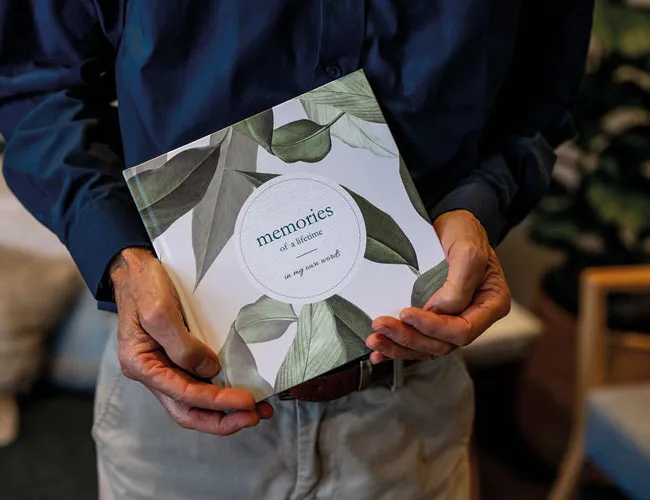
Mr Burstow said completing the book was a project which could easily be broken into small bite-sized pieces, and completed alone or with family over time. However, equally, as the memories flood back, you may not want, or be able to stop filling it in.
Sections such as favourite toy, pet, hobby, movie, book and food growing up, or 'the most beautiful place I have ever been' prompt recollections you may not have considered for years, perhaps decades.
As Winnie the Pooh author A. A. Milne wrote, "We didn't realise we were making memories, we just knew we were having fun".
The fact that the book is filled out in the person's own handwriting - regardless of how good or bad that may be - makes it even more special, and Mr Burstow believes Memories of a Lifetime ... In My Own Words will become "a family's greatest treasure".
"A family given the memories of a lifetime is truly blessed," he said.
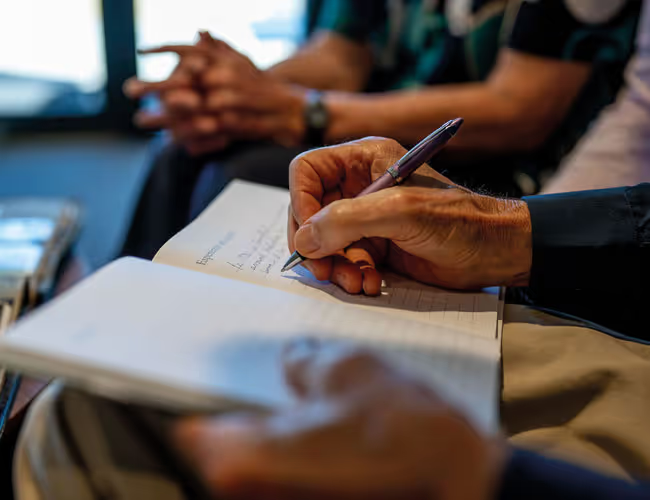
Mr Burstow added that, as a funeral director, having such information on hand when serving a family helped to create a commemoration "full of significance, memories and learning". However, he said, his focus was on the living, in starting discussions and potentially creating new memories.
He hopes the book, with its space for photos as we as words, will bring the writer and those it is left to much pleasure and understanding.
But remember, he said, "we never know when our final chapter is complete, so this book will always be 'my story so far', and something to which people can continue to add".
To receive your complimentary copy of this beautiful book to be filled
with your memories please call our friendly team at Burstows (07) 4636 9600
For thousands of years, funerals have been a means of expressing our beliefs, thoughts, and feelings about the death of someone we love. As you enter into the planning process, you may find it helpful to remind yourself why we have funerals.
The funeral ceremony:
- helps us acknowledge that someone we love has died.
- fosters our memories of the person who died and encourages us to share those memories with others.
- offers a time and place for us to talk about the life and death of the person who died.
- provides a social support system for us and other friends and family members.
- allows us to search for the meaning of life and death.
- offers continuity and hope for the living.
One of the most important gifts of planning a funeral is that it helps you and your family to focus your thoughts and feelings on something meaningful. The funeral encourages you to think about the person who died and to explore the meaning of her life and the ways in which she touched the lives of others.
The remembering, deciding, and reflecting that take place in the planning of the service are often an important part of the process of grief and mourning. And ultimately, this process of contemplation and discovery creates a memorable and moving funeral experience for all who attend.
Wolfelt's Hierarchy of the Purposes of Funerals
The multi-coloured triangle depicts the many reasons why we have had funerals since the beginning of time. The most practical reason is on the bottom of the pyramid, and the most spiritual and significant is at the top.
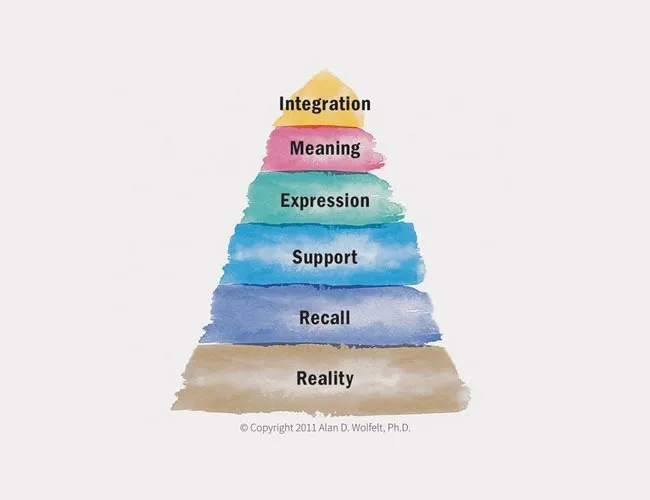
Let's talk a little bit about each layer of the pyramid
Reality
When someone we love dies, we are faced with acknowledging a difficult reality. It is hard to truly accept the finality of death, but the funeral helps us begin to do so. At first we accept it with our heads, and only over time do we come to accept it with our hearts.
Recall
Funerals help us begin to convert our relationship with the person who died from one of presence to one of memory. When we come together to share our memories, we also learn things we didn't know and we see how the person's life touched others.
Support
Funerals are social gatherings that bring together people who cared about the person who died. This reason for having funerals is especially important to remember if the person who died liked to say, "I don't want a funeral. Don't go to any trouble." Funerals are in remembrance of the person who died, but they are for the living. Those who loved the person who died need and benefit from having a special time to support one another in their grief.
Expression
So many thoughts and feelings fill our minds and our hearts when someone we love dies. Collectively, these thoughts and feelings are what we mean by the term "grief." In other words, grief is what's inside us. When we express our grief-by crying, talking to others, sharing memories, taking part in a funeral ceremony-we are mourning. Mourning is grief communicated outwardly. When we grieve but do not mourn, our sadness can feel unbearable and our many other emotions can fester inside of us. Mourning helps us begin to heal. The funeral is an essential time for mourning.
Meaning
Did the person I love have a good life? What is life, anyway? Why do we die? There are no simple explanations, but the funeral gives us a time and a place to hold the questions in our hearts and begin to find our way to answers that give us peace.
Integration
Funerals have a way of getting us to wake up-to think about what we truly care about and how we want to spend our precious remaining days. Ultimately, funerals help us embrace the wonder of life and death and remind us to live deeply, with joy and love.
For centuries, funerals have helped us say goodbye. Funerals honour and remember the person who died. They also surround us with the loving support of friends and family.
Whether you are planning a traditional funeral ceremony or a contemporary memorial service, it helps to understand the parts of a meaningful funeral. Each piece serves a unique purpose and plays an important role.
When you put the pieces together, you create a ceremony deserving of the special life that was lived.
Common Funeral Elements & How They Help Us
The elements of funerals help us express what everyday words and actions cannot.
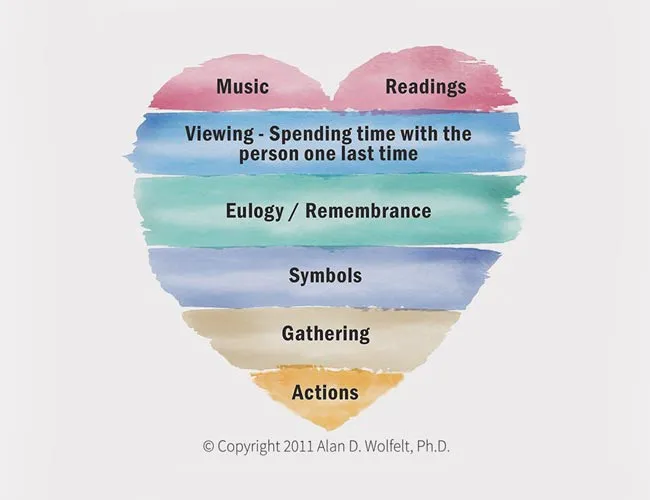
The viewing is a time for family to support one another in their grief. The body is present in an open coffin or casket, allowing you and others who have loved the person who has died to acknowledge the reality of the death and to say final goodbyes.
You may consider giving close friends the opportunity to attend the viewing enabling them the privilege of spending time with the person who has died, and allowing them to express their concern and love for you.
Music
Music is an important part of many social rituals. One of the purposes of music is to help us access our feelings, both happy and sad. During the funeral ceremony, music helps us think about our loss and embrace our painful feelings of grief. Music that has personal meaning to you or the person who died expresses what words alone could never say.
Eulogy / Remembrance
Also called the homily or tribute, the eulogy recalls and celebrates the life story of the person who died. It gives voice to our inner thoughts and feelings about him or her and helps us begin to embrace the meaning of this unique life.
The word "eulogy" comes from the Greek eulogia, meaning praise or blessing. This is the time to give thanks for a person's unique life and to honour his or her memory. This is not the time to bring up painful or difficult memories but to emphasize the good we can find in all people.
Readings
Poems, spiritual or religious verses, and passages from meaningful texts offer words of comfort and support. They eloquently capture our beliefs and feelings.
Actions
After the funeral, friends and family members gather to share memories, express what's on their minds and in their hearts, and support one another. Bonds are often strengthened, and mourners return home with a sense of community and love.
Symbols
Objects such as displayed belongings of the person who died, crosses and other religious items, candles, and flowers give concrete form to our search for meaning in life and death.
Remember...
Generally, using many elements in a funeral creates a more meaningful and healing ceremony. Together they are greater than the sum of their parts. Involving friends and family members makes the funeral even better. Invite as many of them as possible to participate. Someone can be in charge of the guest book. Others can do readings. Maybe someone can sing or play an instrument. Still others may want to provide food for the gathering.
When people and ceremony come together, meaning emerges and healing begins to unfold. If you've been to a special birthday party, wedding, or funeral, you've experienced the magic of ceremony. It is important to plan an element-rich funeral for the person you love.
We all experience the death of a loved one – someone we know and care about – at some point in our lives but for some, sadly, that loss comes earlier than for others.
For children especially this prompts many questions around why the loss has occurred, why they feel as they do, and what happens to their friend or loved one after life ends. Picture books put into images and words that children can understand big concepts like death, loss and grief which even as adults we struggle at times to comprehend or accept.
It can be difficult for adults to know what to say and how much to say (or not say), depending on the child’s age and maturity, and your beliefs (religious or otherwise). You may be struggling just to cope with your own grief.

Picture books can prompt conversations, let children know that they are not alone in their feelings and experiences, and help them to process these.
The time spent snuggling up with your child and a book can also provide a closeness, and feeling of safety for you both. And, in the beautiful simplicity of picture books, you might find recognition too, and shed a healing tear as you relate to the character and their emotions.
Illustrator Kathryn Otoshi says: “… sometimes we don’t know how to voice some of these big feelings that we have, and through the narrative, or sometimes through somebody else’s experience, we’re able to somehow open up …”
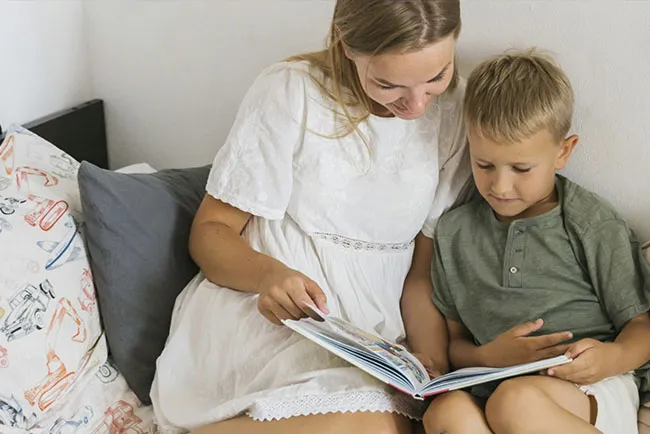
A Special Note to Parents
Please, always read the book yourself first to ensure you are happy with its contents, before sharing it with a child. Think how it makes you feel. You may or may not want to share this with your child as you later read it together.
Think about some of the questions they may ask as a result of reading this book, so you can have answers prepared. Also, be aware there may be questions you never would have thought of. And never be afraid to say, “I’m not sure … maybe we can check that out together”.
Here are four beautiful and heartfelt picture books that may help you and your child in your grief journey, with more books to follow in our next blog.
* Please note, we have a selection of these books available to borrow from Burstows’ Toowoomba office.
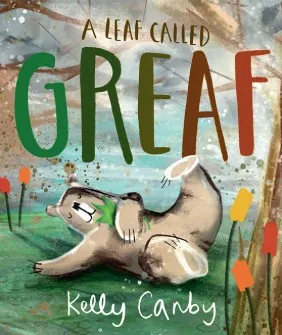
A Leaf Called Greaf
By Kelly Canby
Published in 2024, this is the beautifully written and illustrated tale of Bear, who holds on tight to the one thing that brings him joy in the face of his loss and loneliness, a beautiful green leaf, which he feels connects him to the family he has lost. It suggests it is okay to feel sad and to hang onto things that help you to cope with that sadness … “In the shadow of a tree that felt larger than life itself sat Bear, all alone.”
Bear’s walk is his journey through grief, and tells us that – hard as it is to believe – as time moves on, those deep, dark feelings will give way to lighter feelings, to seeing beauty again, and that’s okay too.
“Bear found comfort in the company of Greaf and couldn’t imagine a time when things didn’t feel just as they felt right now. Until one day ….” As the leaf changes, so does Bear, and eventually he is able to let go of the now-brown leaf, while keeping the memory of those he has lost, who walk beside him as white outlines throughout the book, close.
This book has been hailed as providing a great prompt to discussing the emotions surrounding loss.
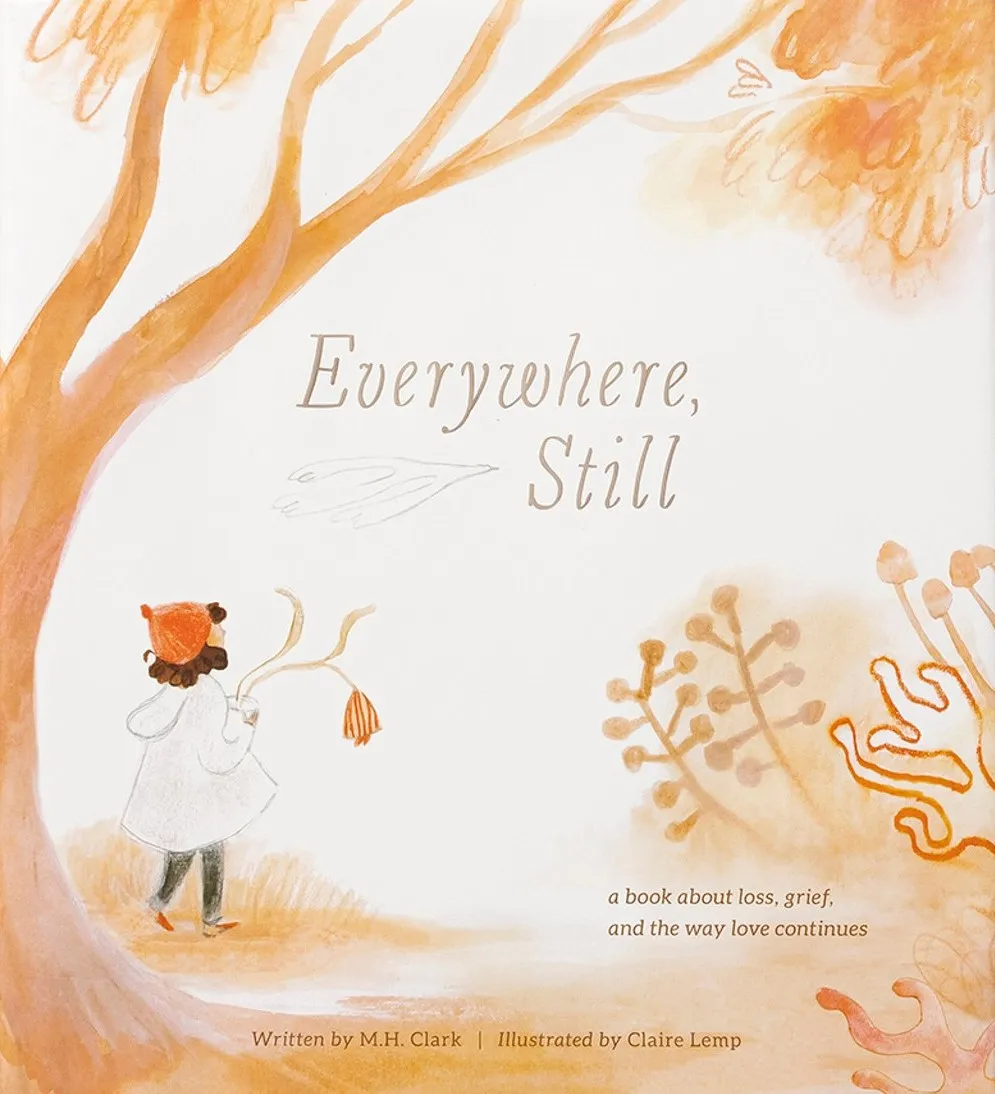
Everywhere Still
By M.H. Clark
In introducing her book, M.H. Clark says she was inspired to help children understand that “loss and grief are as much a part of life as the brighter more joyful aspects,” and that books can “help to create a safe container for processing difficult feelings”.
Everything about this book is gentle, from the soft sepia hues of the pictures to the words:
“I miss you, and I love you.
“I know I always will.
“And even though you’re not here now, I feel you everywhere, still….
“It’s love that keeps me close to you, and keeps you close to me”.
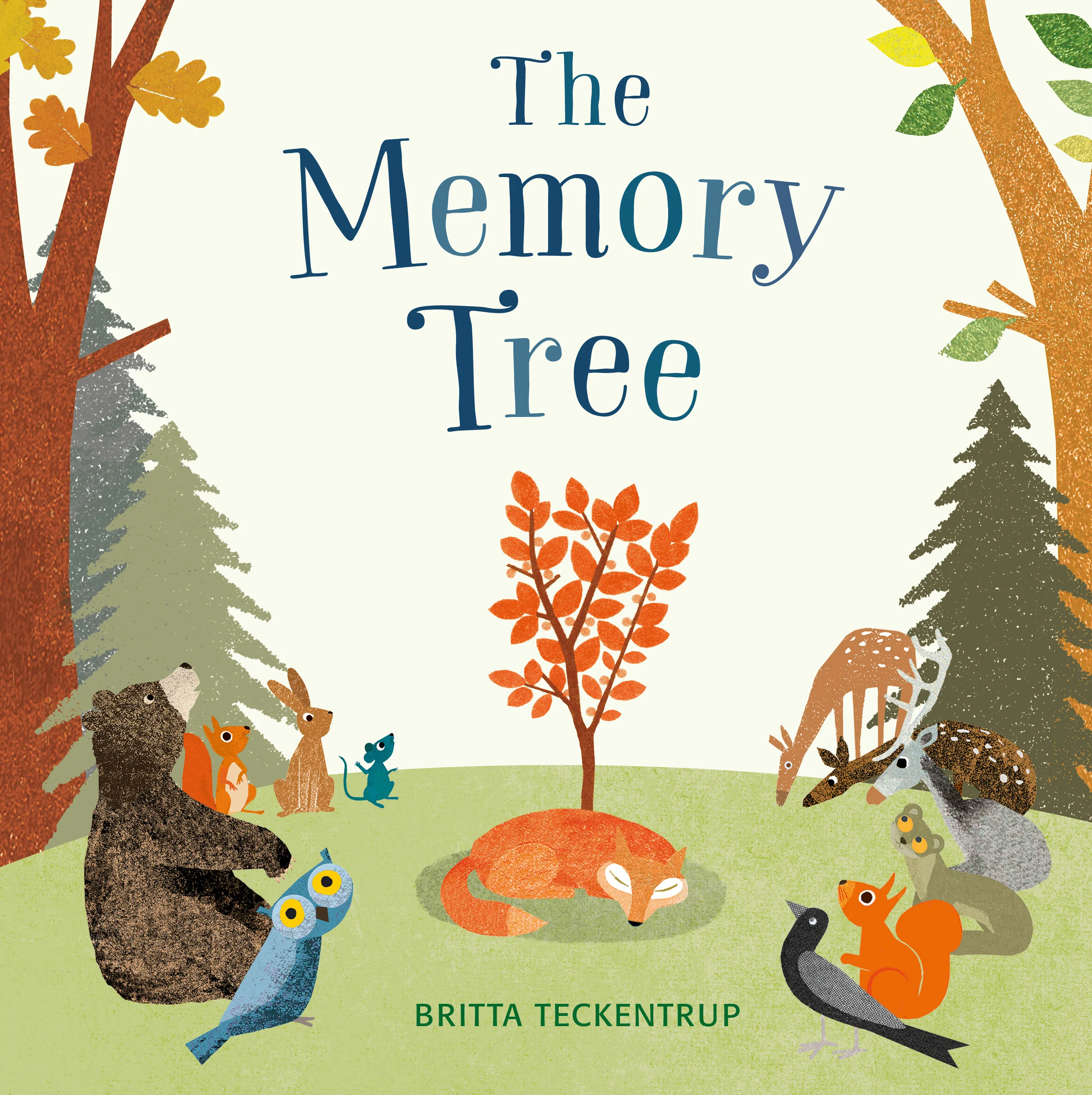
The Memory Tree
By Britta Teckentrup
A beautiful story about the memories which live on, even when a loved one dies. Animal friends gather in the forest after Fox’s death, and as each tells a loving story of how he touched their lives, a tree begins to grow, and their “heavy hearts begin to feel lighter”. They realise that even though Fox is gone, he is still a part of them, and as the tree “made from memories, and full of love” grows, it provides them with shelter and support.
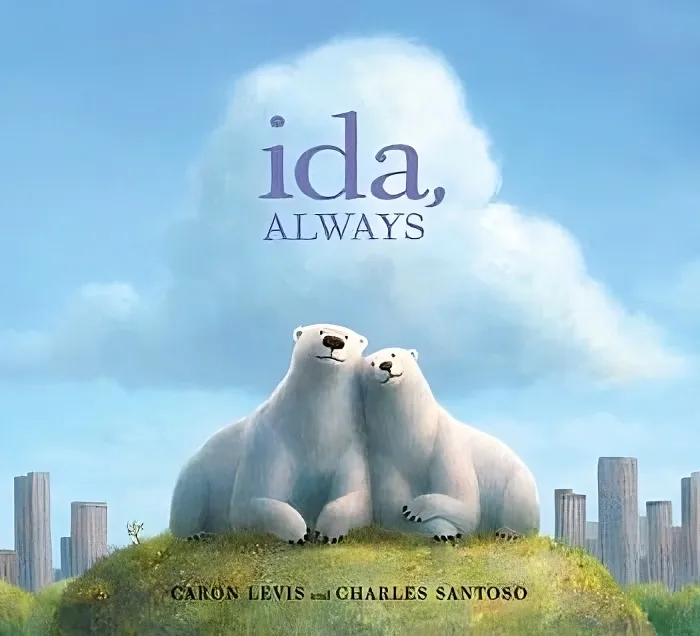
Ida, Always
By Carol Levis, illustrated by Charles Santoso
Taking a different perspective, this book gently explores the time before death when you know that someone special, who has always been there with you, is dying. Through two polar bears – modelled after a real pair from New York’s Central Park Zoo – readers come to understand the anger around the idea of loss, then acceptance, learning to make the most of the time you have, that it’s okay to still laugh, the need to care for each other, and that that person will be there … always. “You don’t have to see it to feel it ….”
– You will find details of four more beautiful picture books, as well as Dr Wolfelt’s 100 Practical Ideas guide for children in our next blog.
The aim of all the books highlighted in this and the previous blog is to provide understanding and hope. You and your child may feel exactly as the characters do, or just a little – everyone’s grief is individual. However, seeing other people’s stories may open hearts to a greater understanding that, while you will never stop missing and loving the person who died, nothing can take your memories away and, in that way, your loved one will always live on in you.
It may also help your little one to understand what friends who have lost a loved one are going through, why they may not seem quite themselves at the moment and may need a little space or a little extra TLC. So, let’s dive into our next selection…
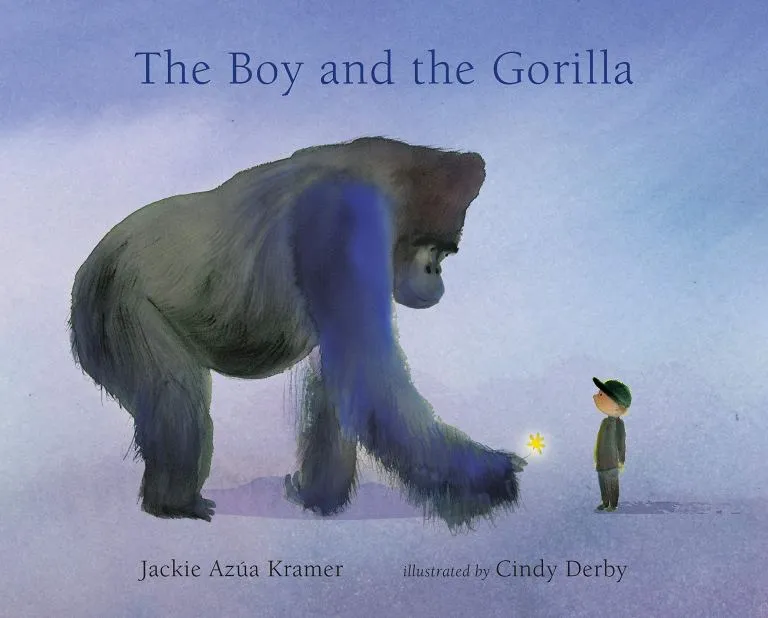
The Boy and the Gorilla
By Jackie Azua Kramer, illustrated by Cindy Derby
Grief here takes the form of a gorilla, which shows up after a young boy has lost his mother. The book’s power is in allowing the boy to speak to Grief as a large, physical but not frightening character. There is very little colour in the early pages, as the boy and his father struggle to accept the mother’s death.
Through the gorilla’s honest answers to his questions, such as “Why did she have to die?” … “All living things die. It hurts not to be able to be with someone we love,” colour begins to re-enter the boy's world; he reaches out to his father and they share their feelings and memories, and start to live their own lives again.
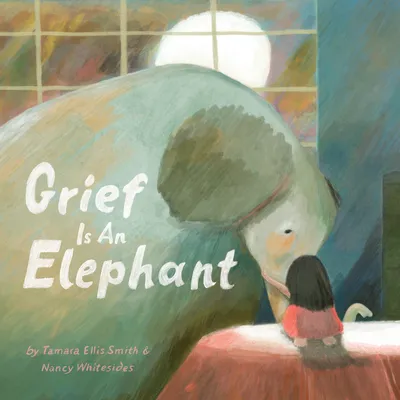
Grief is an Elephant
By Tamara Ellis Smith, illustrated by Nancy Whiteside
Grief shape-shifts into different animals in this book, dealing with the physical as well as emotional impact of grief. Grief starts as an elephant … “Sometimes grief is an elephant, it’s hard to breathe under all that grief …” then as a deer, which you try but can’t seem to leave behind. Then it transforms into a fox which sneaks around, showing up when you don’t expect it, until, one day, it returns as nothing more than a mouse. Finally as you talk about your feelings, grief becomes smaller and smaller until it flies into the night sky, like a firefly … a beautiful memory you know is still there.
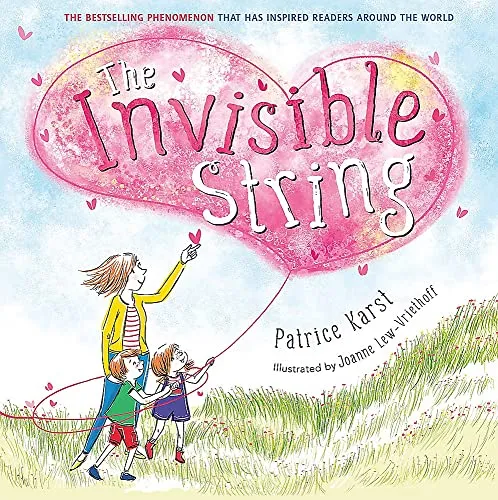
The Invisible String
By Patrice Karst, illustrated by Joanne Lew-Briethoff
This has become a ‘go to’ for many in helping children deal with absence and grief, and was followed by The Invisible Leash, which deals with the loss of a pet – the first loss many children have to deal with. The mother tells her children that even when she is not physically with them, they are bound together by an invisible string of love, which similarly links you to “everyone you love” and which reaches “anywhere and everywhere”, even to Heaven.
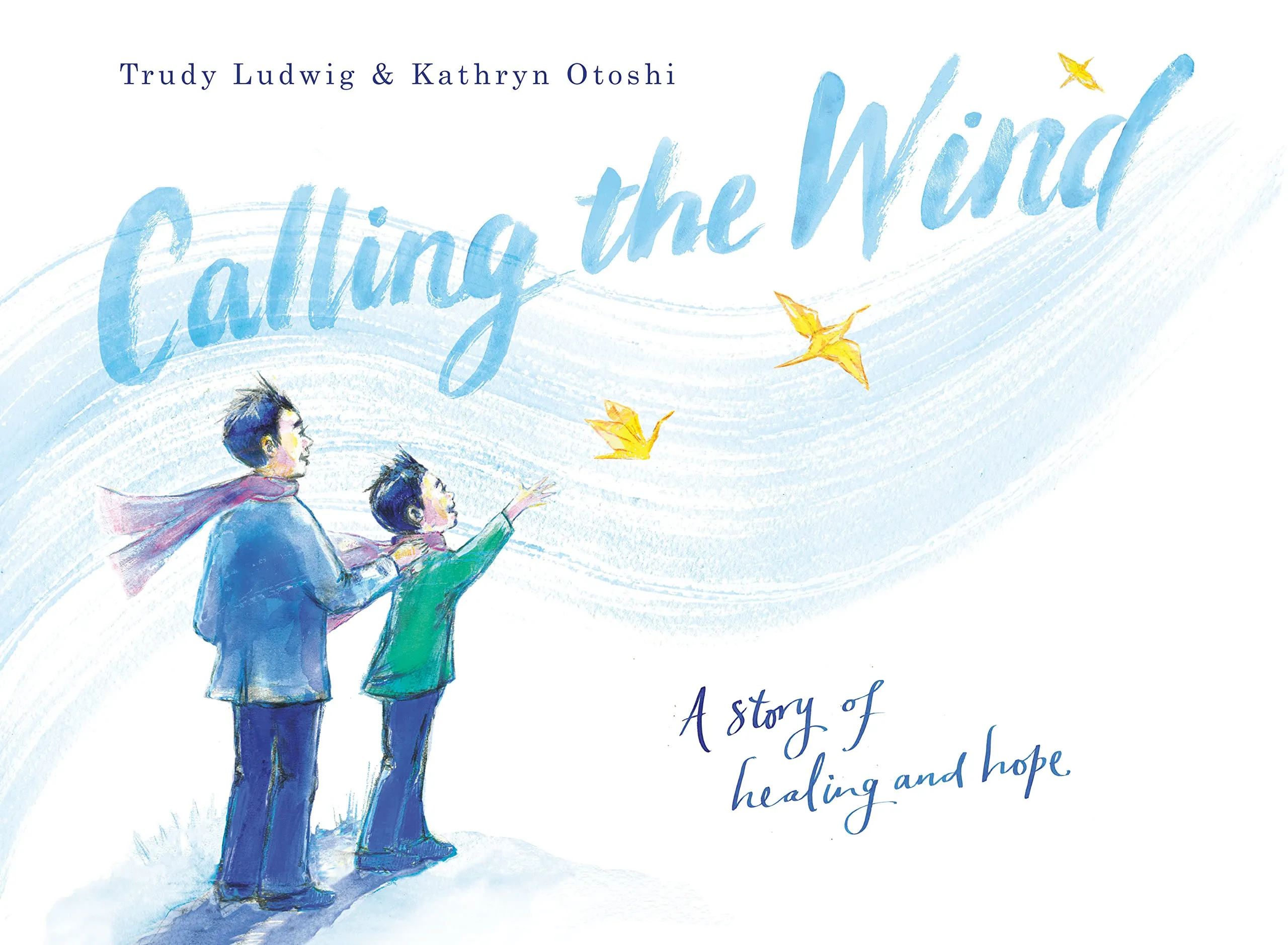
Calling the Wind
By Trudy Ludwig, illustrated by Kathryn Otoshi
Set in Japan, with beautiful watercolour pictures, this book explores how family members deal with their sadness, anger, grief and loss over the death of the mother. Each grieves in their own way, and only starts to heal and find hope through the discovery of a phone that lets each express their bottled up feelings directly to their loved one and to each other.
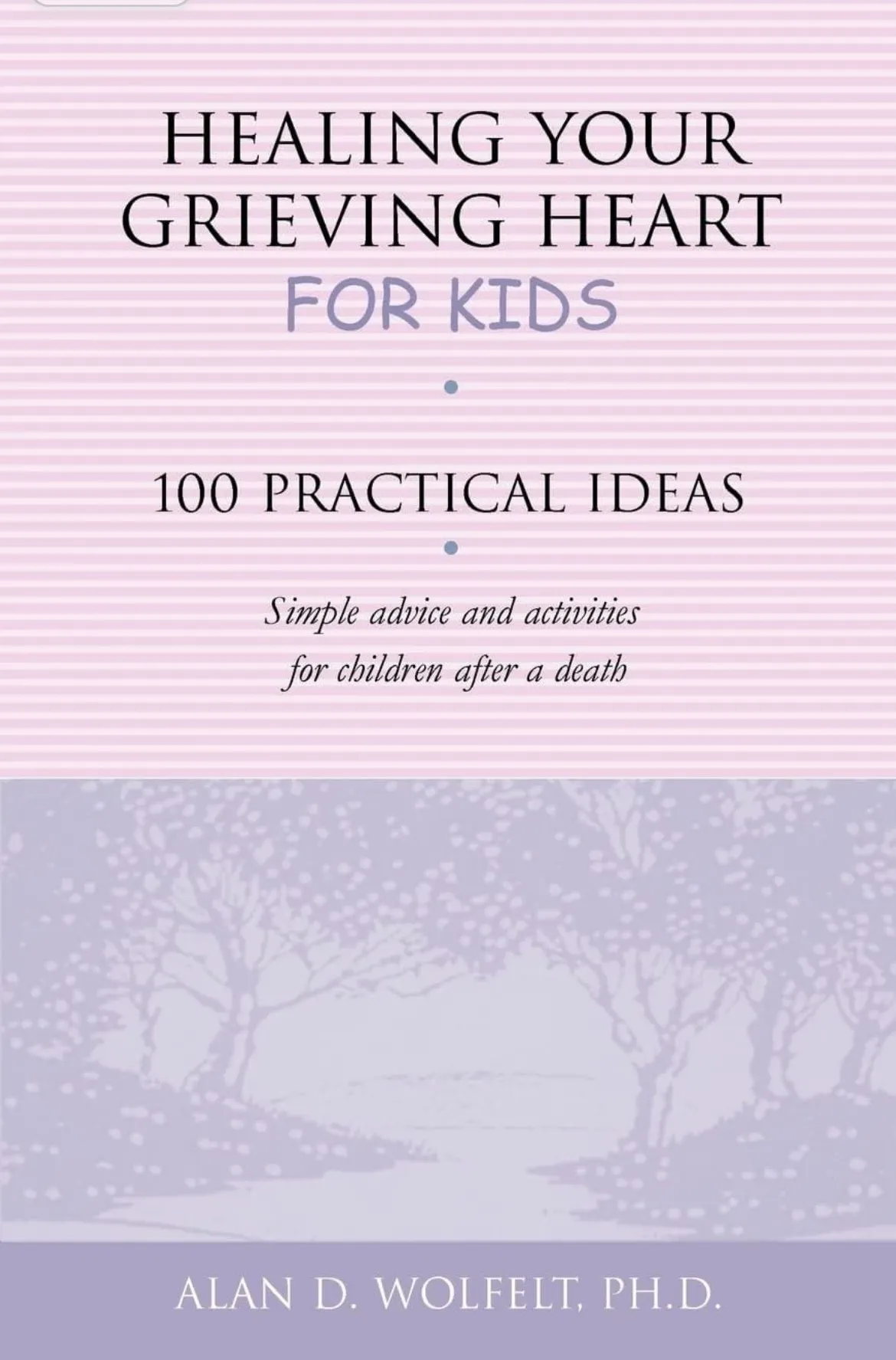
Healing Your Grieving Heart:
For Kids … 100 Practical Ideas
By Dr Alan Wolfelt
This companion workbook is full of advice and activities for children 6-12 years old. While not a picture book as such, each of the 100 simple prompts encourage kids to “write or draw your feelings about this”.
After more than 30 years in grief counselling, Dr Alan Wolfelt says, “The most important lesson grieving children have taught me is that they need to mourn”.
“Letting your grief out is called mourning. You need to mourn so you can start to feel better. If you don’t mourn, your feelings will stay all bottled up inside.”.
“It’s okay to feel whatever you feel: sad, mad, maybe scared, sometimes even happy. No feelings are wrong or bad.” However, Dr Wolfelt adds, “Hurting yourself or someone else is never okay. Your life is hard right now, but it will get better. Lots better. People love you. You’re a special kid.”
He encourages children to speak to adults about their grief, to express their emotions in words, writing, art, music or play, tears, cuddles and comfort. Sometimes, he acknowledges, “maybe you need some extra help with your feelings”.
As Dr Wolfelt concludes, “Your future is yours to create”.
* Please note, we have a selection of these books available to borrow from Burstows’ Toowoomba office.


